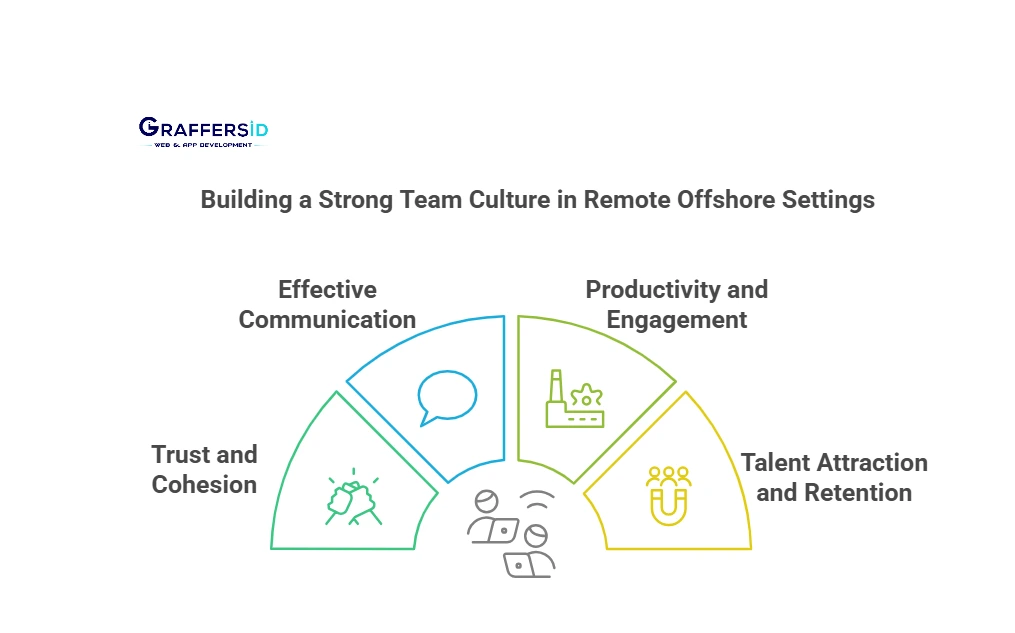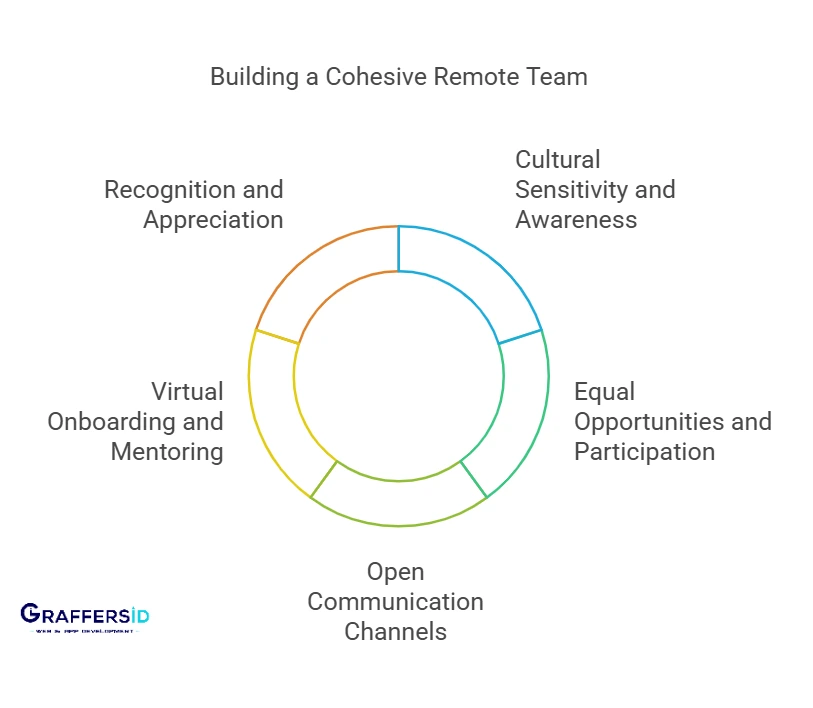A lot of companies are opting to hire remote web development companies. There are several benefits that accompany this hiring method, including saving costs, access to global talent, and working in real-time across various time zones. However, hiring remote developers also comes with certain challenges. One big challenge is maintaining a strong team culture when employees are spread across various locations.
An effective remote team culture helps in fostering unity, trust, and a shared sense of purpose, regardless of geographical distance. This culture is what binds individuals together, helping them engage and work harmoniously with each other toward organizational goals. When companies neglect or underestimate team culture, they run the risk of miscommunication, morale drop, and low productivity. However, all the efforts in creating such a culture reaps immense rewards: better engagement amongst developers, and a better breeding ground for collaboration and an environment that spurs creativity. In this article, we will look at how a company can build a strong remote team culture for offshore developers by discussing how it matters, how it affects the productivity, and sure-shot ways for building a supportive environment.
Read Also: Cost effective strategies for hiring remote developers
Importance Remote Team Culture for Offshore Develoepers

Remote teams must build a culture that matches- if not better than- in-office culture. Since remote teams are hundreds and thousands of miles away from the company headquarters, it is essential to have a culture that respects diverse backgrounds and makes everyone feel a part of something bigger. So, while this requirement is not very pronounced when building a remote team, it is certainly a very important one.
Establishing Trust and Cohesion
Since the developers are not in sight, rather on a screen, it is easy for misunderstandings to arise through wrong assessment of a text or tone. Trust is very important amongst remote teams, but it is hard to build when teams are scattered. However, if your team has a well-articulated culture, this friction can reduce. It helps in guiding and establishing certain rules and regulations that go beyond geographical boundaries. It also helps instill cohesion in the company.
Promoting Effective Communication
Setting clear communication patterns and channels is very important in remote teams as they heavily rely on platforms of email, chat, and video conferences. A strong culture includes established guidelines for when and how to communicate, and hence helps in avoiding any issues that may rise because of miscommunication. It helps recognise the fact that the team consists of people from various diversities and backgrounds.
Enhancing Productivity and Engagement
The team culture you set will decide how the employees perceive their role in any organization. When remote developers feel more valued and connected, they tend to be more motivated and productive. If there is a lack of cultural cohesion, it can result into feelings of alienation, reduction in morale, and ultimately leading to burnout.
Attracting and Retaining Talent
Remote developers are high in demand and can be highly selective about where they work. They look for companies that have a good culture and other benefits. So having a strong culture can set your company apart from others, attracting quality talent.
Creating an Inclusive and Engaging Remote Team Culture
Since the developers come from various backgrounds, it is important for them to feel inclusive and bring their best selves to work. The developers should feel comfortable in sharing their ideas and thoughts. So, by building an environment that encourages engagement and individual personalities, remote teams can thrive and work better.

Cultural Sensitivity and Awareness
As offshore developers hail from different places, it is essential to cultivate an inclusive culture that fosters understanding and inclusivity. Everyone should try to learn about each other’s customs, holidays, and traditions. Small gestures like wishing for any festival or greeting during regional celebrations can go a long way.
Equal Opportunities and Participation
Supervisors should assign tasks and projects fairly, giving everyone a chance to take a lead. This way, the entire team would feel valued, engaged, and fulfilled in contributing to projects. All the members deserve to get fair and equal treatment in their career trajectory.
Open Communication Channels
Creating a culture in which everybody can talk openly requires open communication. Managers should encourage their offshore developers to talk candidly about their concerns, ideas, or obstacles. One way to make that happen is to make time for regular one-on-one check-ins between employees. With these, team members can discuss personal development alongside work-related topics. Alternatively, set up channels or dedicated spaces in the communication platform for teams to talk about other things not related to work. In this way, you can have the virtual version of exchanging information at the “water cooler.”
Virtual Onboarding and Mentoring
The spirit of new offshore members in a distant team is established by their orientation process. If fresh members are welcomed through organized orientation sessions, they will acclimatize to company culture and operational processes faster. Pairing them up with mentors can also serve to provide them with a ready answer when they face any difficulty because it will allow for guidance to be given properly to them regularly during the day.
Recognition and Appreciation
Appreciation remains the most treasured reward by employees, may it be with remote employees or in-office employees. The simple gestures like shout-outs on team calls, personal thank-yous, or public recognitions conveyed via communication channels ultimately make someone else’s day. You are inspired by such practices and encourage your coworkers to give credit to others’ efforts, thus generating synergy and camaraderie.
Fostering Collaboration and Team Spirit to build Remote Team Culture
To begin with, it’s important to note that the very nature of offshore development is centered around remote work. However, the problem of proper communication commonly arises and if not addressed properly, these developers would always feel isolated, especially if they are staffed into teams composed of members from different countries. Below are key tactics for ensuring your offshore developers feel connected and collaborative, despite physical distance.

Set Clear Goals and Expectations
By setting clear goals and expectations for your offshore developers, which leads to clarity in how they should proceed. Effective use of project management tools can help leaders can keep everyone on the same page regarding their responsibilities, objectives, and success criterias.
Encourage Pair Programming and Peer Review
By pairing two or more developers together, companies can create more opportunities for collaboration, improving code quality, and knowledge sharing. This leads to more interaction and peer reviews leading to more enhanced feedback and honest communication.
Cross-Functional Projects and Team Assignments
Teams should be allowed or encouraged to collaborate with departments other than their own. It helps the developers gain more perspective and respect their peers. It also enhances creativity as team members learn different problem-solving approaches.
Establish Team Rituals
Rituals are collective events that work to develop a sense of togetherness. There can be daily stand-up meetings, weekly check-ins, and monthly virtual meetings. Regularity is what matters: with regularity,leaders provide offshore developers with opportunities for interaction and joint activities.
Celebrating Successes and Milestones in Remote Teams
Recognizing accomplishments might appear inconsequential, but it greatly aids in cultivating a healthy remote team culture. As distance and time zones constrain developers, strong emphasis should be placed on celebrating both significant and minor goals. Celebrating individual and team achievements promotes the feeling of belonging to the company and increases motivation. Some of the suggestions listed below can help keep virtual teams engaged in the culture of celebration.
Regularly Highlight Team Achievements
You can begin the meeting by remembering the latest successes, achieved milestones or new fixes. For example, you can thank the whole team for completing the sprint on time or commend the developer for fixing the critical bug. The catch in such scenarios is that focus on achievements. It is also a practice that builds a positive feedback cycle: the greater the recognition of team members the greater the desire to perform.
Personalized Celebrations
Personal acknowledgments can really make developers feel seen, apart from group celebrations. Upon reaching certain milestones, the company can reward developers with small gifts like gift cards, certificates, or personal tokens of gratitude. This keeps the remote team motivated to perform better.
Virtual Celebratory Events
Even though the aspect of physical meeting is removed in remote work, it is still possible to host virtual happy hours, coffee breaks, and themed parties online. For example, when your team completes an intensive project, the leaders can plan and organize a cool-off activity like escape rooms, trivia hour, or anything which will relax them.
Publicizing Successes Beyond the Team
Big wins should be shared with the whole company instead of just being kept between the team. Significant achievements should be broadcasted in company channels and newsletters. This reminds them that their contributions are valued on a larger scale.
Documenting and Reflecting
When a developer has a good run, they should make a habit of documenting the process and their learnings. The entire team can discuss the strategy that worked for them, which will help in future endevours.
Tools and Activities to Enhance Remote Team Culture
- Communication and collaboration- Slack, Microsoft Teams, Zoom, Google Meet
- Project Management and Productivity Platforms– Jira, Trello, Asana, GitHub or GitLab
- Cultural and Personal Exchange Initiatives- show and tell sessions, coffee roulette, shared milestone celebration
- Wellness and work-life balance- mental health check-ins, encouraging digital detox, flexibility and async schedules
Conclusion
It is clear that building a strong remote team culture is important to foster growth and productivity. The environment that you create and the work that developers do go hand in hand. If you want your team to yield successful results, follow the strategies that we have talked about above and results will be noticable.
By hiring GraffersID, you will not have to worry about the developers not adopting your culture- we have the best ones on board! From offshore web and software development services to remote developers on contract, we have a range of solutions to bring your tech visions to life. Contact us today.



